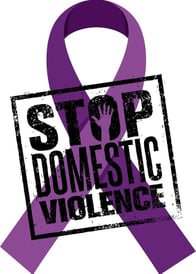While many may know that October is National Breast Cancer Awareness Month, it is also National Domestic Violence Awareness Month. According to The Center for Family Justice, domestic abuse is defined as “a pattern of coercive, controlling behavior that is a pervasive, life-threatening crime affecting people in all communities regardless of gender, age, sexual orientation, race, ethnicity, religion, social standing, and immigration status.”

How Widespread is Domestic Violence?
According to the National Domestic Abuse Hotline, on average, 24 people per minute are victims of rape, physical violence, or stalking by an intimate partner in the United States. That's more than 12 million women and men over the course of a year. In addition, the National Domestic Violence Hotline and loveisrespect answered over 323,000 calls, chats, and texts in 2016 regarding domestic violence.
Are There Different Types of Domestic Abuse?
Yes, there are several types of abuse which are explained below.
- Physical Abuse: Any physically aggressive behavior, withholding of physical needs, indirect physically harmful behavior, or threat of physical abuse. (Examples include choking, slapping, shaking, pushing, pulling, punching, beating, scratching, pinching, pulling hair, stabbing, burning, hitting with an object, etc.)
- Financial Abuse: A way to control the victim through manipulation of economic resources. (Examples include spending money on non-essential items such as drugs, alcohol, etc.; controlling one's income by not allowing the victim access to money or rigidly limiting their access; keeping financial secrets or hidden accounts; etc.)
- Emotional Abuse: Any controlling behavior that the abuser uses to maintain their dominance over the victim. (Examples include monitoring phone calls, calling or coming home unexpectedly to check up on the other, not allowing the other to choose their clothing, makeup, or hairstyle, etc.)
- Sexual Abuse: Using sex in an exploitative fashion or forcing sex on another person, even if consent to sexual activity was given in the past. (Examples include using force, coercion, guilt, or manipulation to have sex; laughing or making fun of another’s sexuality or body, making offensive statements, insulting, or name-calling; making contact with the victim in any nonconsensual way, etc.)
- Verbal Abuse: Any abusive language used to denigrate, embarrass, or threaten the victim. (Examples include vulgar name calling, yelling, screaming, rampaging, terrorizing, refusing to talk, etc.)
What Are the Signs of Domestic Abuse?
The following are warning signs in which someone may be abusive:
- Multiple personas
- Extremely possessive and jealous
- Belittles their partner's intelligence
- Blames the victim for their abusive & controlling behavior
- Isolates their partner from family & friends
- Humiliates their partner
- Encourages their partner to quit school or their job
- Dominates every conversation
- Threatens their partner when they ask for any sort of privacy
- Gets angry when anyone disagrees with them
- Overreacts and throws tantrums when they don’t get their way
- Threatens to take money/possessions/children away
- Unpredictable violent tempers

What’s it Like Living With an Abuser?
Someone who's living with an abusive partner may experience the following:
- The constant feeling of "walking on egg shells" around their abuser.
- Feeling forced to account for and defend what they did throughout the day.
- Feeling ashamed that they're with someone who abuses them.
- Being afraid to ask their abuser for something out of fear in angering them.
- Constant obedience of their abuser's request(s) in hopes of not angering them.
- Scared to leave in the result that their abuser will begin to stalk/harass them, or because they're dependent on their abuser for basic necessitates (food, shelter, etc.).
How Can Someone Get Out of an Abusive Relationship?
There are a few ways someone can get out of an abusive relationship, which includes:
- Finding someone to trust and confiding in them about what’s going on.
- Creating/updating their resume in order to look for a job.
- Setting aside money in order to have some cash on hand.
- Creating a mental list of what to take and what to leave behind when leaving their abuser.
- Thinking about what friends and/or family members they can stay with.
- If there's nowhere safe to go, finding a domestic violence shelter and calling them for advice/support.
Where Can Someone Find Help Locally?
If you or someone you know is in an abusive situation and lives near Athens, Hocking, or Vinton Counties, contact My Sister’s Place for help. My Sister's Place is a domestic violence agency located in Athens and offers services including a 24/7 hotline, outreach counseling, and an emergency shelter.



